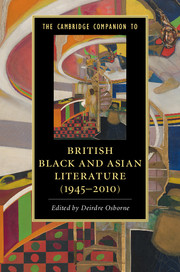Book contents
- Frontmatter
- Dedication
- Contents
- Contributors
- Acknowledgements
- Timeline
- Introduction
- PART I TRACES AND ROUTES
- PART II TRANSLOCATIONS AND TRANSFORMATIONS
- 3 Liberationist Political Poetics
- 4 Women's Fiction and Literary (Self-) Determination
- 5 Brutalised Lives and Brutalist Realism: Black British Urban Fiction (1990s–2000s)
- 6 Stages of Representation
- PART III RESTORATIONS AND RENOVATIONS
- PART IV NATIONAL, INTERNATIONAL, TRANSGLOBAL
- Further Reading
- Index
- Series list
4 - Women's Fiction and Literary (Self-) Determination
from PART II - TRANSLOCATIONS AND TRANSFORMATIONS
Published online by Cambridge University Press: 05 September 2016
- Frontmatter
- Dedication
- Contents
- Contributors
- Acknowledgements
- Timeline
- Introduction
- PART I TRACES AND ROUTES
- PART II TRANSLOCATIONS AND TRANSFORMATIONS
- 3 Liberationist Political Poetics
- 4 Women's Fiction and Literary (Self-) Determination
- 5 Brutalised Lives and Brutalist Realism: Black British Urban Fiction (1990s–2000s)
- 6 Stages of Representation
- PART III RESTORATIONS AND RENOVATIONS
- PART IV NATIONAL, INTERNATIONAL, TRANSGLOBAL
- Further Reading
- Index
- Series list
Summary
‘I am British But…’
In a post-war migratory, cultural trajectory that was articulated initially and predominantly by men, black and Asian women writers in Britain have used prose fiction to achieve literary self-determination. Broadly defined as the agency to author one's identity against a prescriptive social order, the recognition of this self-determination forms a matrilineal alternative to the ‘malestream’, and restores women's creativities and perspectives to contemporary British literature and its post-war history. In this chapter ‘(British) Asian’ indicates writers whose ancestral origins emanate from India, Pakistan, Bangladesh and Sri Lanka, whereas ‘black (British)’ refers to recent authors whose provenances hail from African and Caribbean heritages. This distinguishes the categories from an earlier point in post-war history where the term ‘Black British identity’ was initially constructed along the axis of oppression, and anti-colonial movements in Asia, Africa and the Caribbean fuelled the sense of solidarity between African-Caribbean and South Asian people in Britain. According to Avtar Brah, the term ‘Black British’ first gained currency in the late 1960s and early 1970s, and was adopted by African-Caribbean and South Asian organisations that used the designation for ‘constituting a political subject inscribing politics of resistance against colored-centered racisms’. Many British Asians, however, chafed at this deployment of a unitary Blackness as its organising principle, which often subsumed the life stories of Asian Britons under its homogenous order – just as it ignored the substantial differences between the cultures of African and Caribbean nations. While there may be some valence to this objection, we must also remember that it originates from a racialising, economic and class bias, since upper- and middle-income Asians were generally the ones who staunchly objected to being called ‘black’.
Nonetheless, the racialised experiences of non-white people in Britain have always shared some common themes. Black British remains a useful mode to understand how disenfranchised groups have articulated a powerful sense of community solidarity – not just against unofficial on-the-streets racism, but also the official racism of the Thatcher-led state, which was inordinately successful in promoting ethnic and gender divisions. As Beatrix Campbell notes, Margaret Thatcher's ‘political project was the antithesis to the equality project’. Moreover, in proudly recalibrating a word historically laden with pejorative connotations, ‘Black British’ exemplifies the self-authoring practices within a hegemonic discourse that form the argumentative crux of this chapter.
- Type
- Chapter
- Information
- Publisher: Cambridge University PressPrint publication year: 2016
- 1
- Cited by



